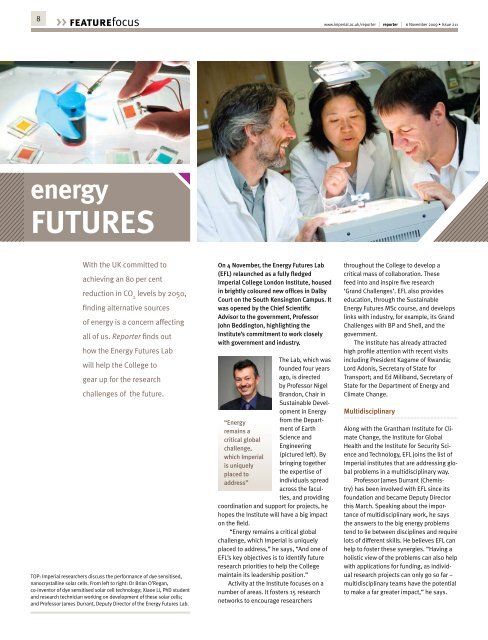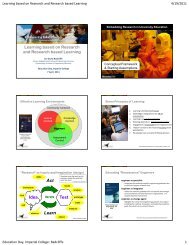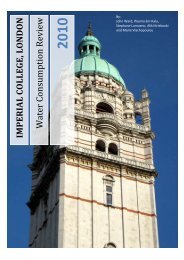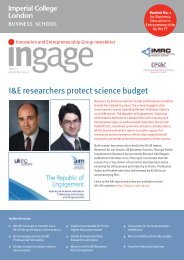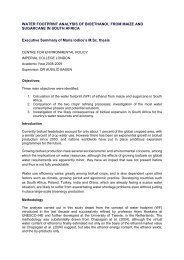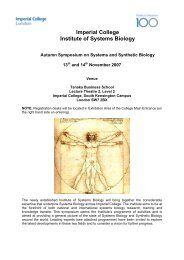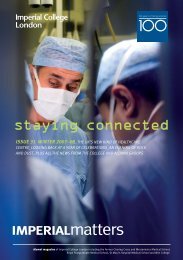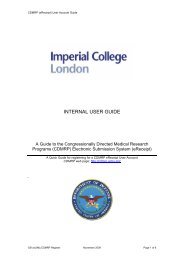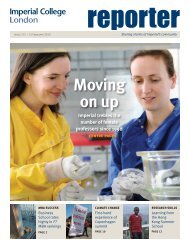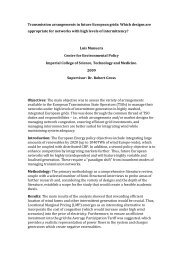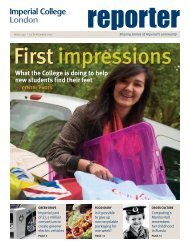211 pdf - Imperial College London
211 pdf - Imperial College London
211 pdf - Imperial College London
Create successful ePaper yourself
Turn your PDF publications into a flip-book with our unique Google optimized e-Paper software.
8<br />
>> featurefocus www.imperial.ac.uk/reporter | reporter | 6 November 2009 • Issue <strong>211</strong><br />
energy<br />
fu t u r e s<br />
With the UK committed to<br />
achieving an 80 per cent<br />
reduction in CO 2<br />
levels by 2050,<br />
finding alternative sources<br />
of energy is a concern affecting<br />
all of us. Reporter finds out<br />
how the Energy Futures Lab<br />
will help the <strong>College</strong> to<br />
gear up for the research<br />
challenges of the future.<br />
TOP: <strong>Imperial</strong> researchers discuss the performance of dye sensitised,<br />
nanocrystalline solar cells. From left to right: Dr Brian O’Regan,<br />
co-inventor of dye sensitised solar cell technology; Xiaoe Li, PhD student<br />
and research technician working on development of these solar cells;<br />
and Professor James Durrant, Deputy Director of the Energy Futures Lab.<br />
On 4 November, the Energy Futures Lab<br />
(EFL) relaunched as a fully fledged<br />
<strong>Imperial</strong> <strong>College</strong> <strong>London</strong> Institute, housed<br />
in brightly coloured new offices in Dalby<br />
Court on the South Kensington Campus. It<br />
was opened by the Chief Scientific<br />
Advisor to the government, Professor<br />
John Beddington, highlighting the<br />
Institute’s commitment to work closely<br />
with government and industry.<br />
“Energy<br />
remains a<br />
critical global<br />
challenge,<br />
which <strong>Imperial</strong><br />
is uniquely<br />
placed to<br />
address”<br />
The Lab, which was<br />
founded four years<br />
ago, is directed<br />
by Professor Nigel<br />
Brandon, Chair in<br />
Sustainable Development<br />
in Energy<br />
from the Department<br />
of Earth<br />
Science and<br />
Engineering<br />
(pictured left). By<br />
bringing together<br />
the expertise of<br />
individuals spread<br />
across the faculties,<br />
and providing<br />
coordination and support for projects, he<br />
hopes the Institute will have a big impact<br />
on the field.<br />
“Energy remains a critical global<br />
challenge, which <strong>Imperial</strong> is uniquely<br />
placed to address,” he says, “And one of<br />
EFL’s key objectives is to identify future<br />
research priorities to help the <strong>College</strong><br />
maintain its leadership position.”<br />
Activity at the Institute focuses on a<br />
number of areas. It fosters 15 research<br />
networks to encourage researchers<br />
throughout the <strong>College</strong> to develop a<br />
critical mass of collaboration. These<br />
feed into and inspire five research<br />
‘Grand Challenges’. EFL also provides<br />
education, through the Sustainable<br />
Energy Futures MSc course, and develops<br />
links with industry, for example, its Grand<br />
Challenges with BP and Shell, and the<br />
government.<br />
The Institute has already attracted<br />
high profile attention with recent visits<br />
including President Kagame of Rwanda;<br />
Lord Adonis, Secretary of State for<br />
Transport; and Ed Miliband, Secretary of<br />
State for the Department of Energy and<br />
Climate Change.<br />
Multidisciplinary<br />
Along with the Grantham Institute for Climate<br />
Change, the Institute for Global<br />
Health and the Institute for Security Science<br />
and Technology, EFL joins the list of<br />
<strong>Imperial</strong> institutes that are addressing global<br />
problems in a multidisciplinary way.<br />
Professor James Durrant (Chemistry)<br />
has been involved with EFL since its<br />
foundation and became Deputy Director<br />
this March. Speaking about the importance<br />
of multidisciplinary work, he says<br />
the answers to the big energy problems<br />
tend to lie between disciplines and require<br />
lots of different skills. He believes EFL can<br />
help to foster these synergies. “Having a<br />
holistic view of the problems can also help<br />
with applications for funding, as individual<br />
research projects can only go so far –<br />
multidisciplinary teams have the potential<br />
to make a far greater impact,” he says.


